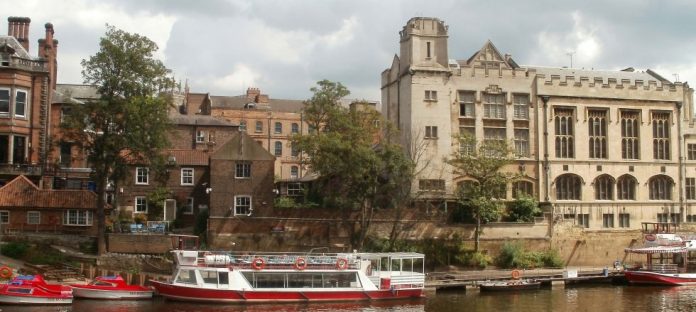The work will focus on the site of the Hutments building, on the northern side of the Guildhall, which is located on the site of a medieval Augustinian Friary, often occupied by Richard III when he stayed in the city. The excavations will be open to the public and will be accompanied by a range of training workshops and activities. All events will be completely FREE and all are welcome.
 The excavation of the medieval and earlier remains will begin in August, with a wide range of opportunities for volunteers and visitors to participate in the work. However, before the digging begins, we would like to uncover more of the history of the Hutments building itself.
The excavation of the medieval and earlier remains will begin in August, with a wide range of opportunities for volunteers and visitors to participate in the work. However, before the digging begins, we would like to uncover more of the history of the Hutments building itself.
It dates to the early 20th century – but was it constructed before the Second World War or was it built to provide temporary offices following the bombing of the Guildhall in 1942?
We would love to hear from anyone that may have any memories or photographs of the site from around this time – perhaps you worked in the building, or nearby, or remember the area during the war?
Mitchell Pollington of AOC said: “During the medieval period, the site was occupied by an important friary founded in 1272. In the late 15th century the future King Richard III famously stayed at the friary when visiting the city, and many local nobles killed during the Wars of the Roses are thought to have been buried on the site. It is hoped that the excavation will shed new light on the lives of the friars, the location of the friary buildings and possibly the identities of those who were buried here.
“The site is also located just upstream of the probable location of York’s Roman bridge that provided access to the Roman legionary fortress, which was centred on the site now occupied by York Minster, between AD 71 and AD 410. It is possible that the remains of Roman river front structures could survive, preserved in the waterlogged ground and sealed beneath the layers of later medieval occupation.”
Please contact Mitchell Pollington at AOC if you can provide us with any information: mitchell.pollington@aocarchaeology.com or 01904 413 404.
The excavations will start on August 16 , and volunteers can sign up to join the excavation at www.aocarchaeology.com/hiddenguildhall or visit the excavation site, talk to the archaeologists and get involved with a range of free activities, seven days a week until August 31.

